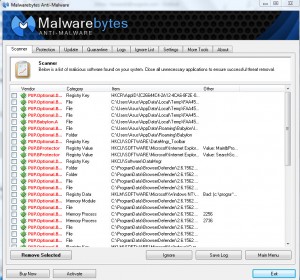Unethical Software Monetization Methods Are Driving Users Nuts
Malwarebytes scan for traces of unwanted toolbar/adware/installations
Freeware has always been a benefit for both users and developers. Developers were happy to provide freeware to users for the opportunity of selling their more powerful versions. Consumers love to get “free software apps” that provide value (not cripple ware). But things have changed. The monetization tool for many software publishers is including a toolbar or installing other applications with their own download. They key to defining where ethical boundaries are crossed are in the disclosure process to the user. This includes the amount of user control in the process of installation, what happens to their computer after installation (are they getting what was expected). Is the PC going to act or perform functions in an unauthorized or non-apparent way after installation that is beyond their control? Users and their computers are unwitting victims of unethical installation practices. Toolbar/Installware actions range from hijacking a user’s web search, slowing down their computers to a crawl through intensive use of CPU slices running their adware, refusing to completely uninstall, no uninstall option, interfering with the browsing experience or by throwing up unwanted ad and deals or altering the destination of where a user expects to go on the net.
Unethical Toolbars and Installers have morphed into the invasive species that now inhabit the download waters. While some are designed ethically and are easy to uninstall, others are becoming alarmingly deceptive and resistant to anything that wants to kill them off much like a MRSA virus. I’ve installed and tested thousands of software applications for WUGNET over the years. Lots of software apps left behind remnants that clutter your registry and make it grow which over time can slow your computer. (Note: This gave birth to a new category of software called “Registry Cleaners”.) Unless you picked up a virus or malware there was no harm or no real foul. Just restore you prior registry backup or system restore.
Over a two day period I downloaded two questionable apps. I then ran a malwarebytes scan and reviewed the results. After cleaning with Malwarebytes just two days earlier, Malwarebytes identified numerous unintended visitors (photo). A search toolbar or installation of additional apps can be benign as implemented in Java, Bing or Ask Toolbars if you stay one step ahead of your brain. That requires clicking your way slowly through the install process.
Toolbars and installers have a valid place in our industry as software because they can provide many benefits to users. If you don’t want to install the additional software included in your download you just uncheck the box(s) which are highly visible. If you wish to uninstall them later you can easily find the uninstall option on a PC in the Control Panel Uninstall. The darker side of unethical toolbar installation borders on malware. Competition is getting so intense that providers of these monetization features are jumping through hoops to find ways not to allow the fish (you) to get unhooked and thereby lose their revenue stream.
Trying to uninstall some of these questionable payloads can be next to impossible for the novice and advanced user to fix. Once you’ve swallowed the hook like and sinker you could be in computer hell until you can restore, remove or reinstall your OS and apps. Search monetization and app installation make a lot of money for the Toolbar and Installer companies who sign up publishers to be a part of their network and pay them $$ for each install. It’s usually a lucrative arrangement for both parties and more software publishers are relying on it for income. And when it’s on the up and up it’s fine.
I recently attended the Affiliate Summit ASE 2013 (August 18-20, 2013) at the Pennsylvania Convention Center in Philadelphia, PA. Affiliate Summit is one of my favorite conferences and I plan on attending Vegas 2014. Among the exhibitors, were many Toolbar and Installer vendors. We spoke to a few of them and got their take on this segment of the software publisher monetization market. Some were very candid and truthful. In order to survive the urge to dabble in stealth installation methods is getting more and more attractive. Some vendors see the death of the toolbar business within 18 months and are already planning for the future. As often happens, market forces can dictate market direciton. What we see happening is a few desperate attempts to keep monetization flowing at all costs. Longer players in this market will avoid falling into this pit and damaging their reputation. The importance of reputation management has always been important.
Developing, distributing and getting paid for the for your software programming efforts has always been a difficult proposition for most small software developers. Business application developers haven’t had it quite as tough. Consumer focused software publishers have been hurting for the last several years due to many reasons including the proliferation of free apps and the app store pricing model. Smartphones apps are replacing functionality of some desktop apps. The unethical Toolbar/Install business can be a very lucrative but distasteful answer to make a living for those software developers who would have otherwise gone out of business. Fortunately, for some publishers most people never know what the source of their misfortune is otherwise, publishers would play “Russian Roulette” with their reputation.
One thing is certain. The industry will have to clean itself up or users will need to find a “safe place” to download software for the desktop. It’s not likely that desktop software will disappear in the next 18 months. Monetization solutions need to come clean and provide seamless uninstalls and have “a do no harm doctrine” before they pollute the pond they fish in. As it dries up, the fish will be swimming closer and closer and the experience will be pervasive.
Howard Sobel, AppVisor
Tags: installers, malware, search, toolbars

